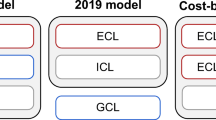Abstract
The processes of changing the way of thinking, typical for modern people, and subsequently shaping a new “Homo clicking” individual are analyzed. The authors consider a specific mindset of “Homo clicking” illustrating it with some patterns and modes of action that characterize individuals in the human–machine interface. Under this frame, the influence of modern converging technologies upon human conduct is examined and functional redistribution between human beings and technical devices is outlined. In the literature, the latter phenomenon is referred to as “life outsourcing.” This material is used to introduce several principles that form the basis for a new type of thought and actions of “Home clicking”: snapping, transforming trust into knowledge, and action reduction. Reducing the traditional classic understanding of a human act of thinking to a pattern of a thinking act as a need-satisfying act is described. In the last section, we introduce an extension of Searle’s Chinese room, which can be seen as a possible consequence of intensive exploitation of technologies.
Similar content being viewed by others
References
Baudrillard J (1981) Simulacres et Simulation. Éditions Galilée. Galilée, Paris
Borgmann A (2012) So who am I really? Personal identity in the age of the internet. AI Soc 28:15–20
Bostrom N (2014) Superintelligence: paths, dangers, strategies. Oxford University Press, Oxford, p 352
Eco U (2011) Art and beauty in the middle ages. 2002. Yale University Press, New Haven
Florensky P (1992) At the watershed of thought, vol 28. Simbol, Paris, pp 125–216 (in Russian)
Heidegger M (1954) Die frage nach der technik. Die Künste im technischen Zeitalter, München, pp 70–108
Hongladarom S (2013) Ubiquitous computing, empathy and the self. AI Soc 28:227–236
Jung C (1958) Gut und Böse in der analitischen Psychologie. Gesammelte Werke. Walter-Verlag, Olten, Bd 10
Kapp E (1877) Grundlinien einer Philosophie der Technik. Zur Entstehungsgeschichte der Cultur aus neuen Gesichtspunkten, Braunschweig, p 42
Kile F (2013) Artificial intelligence and society: a furtive transformation. AI Soc 28:107–115
Lanir J (2010) You are not a gadget. Alfred A. Knopf, N.Y., p 209
Laszlo E (2001) Macroshift: navigating the transformation to a sustainable. World Berrett-Koehler, San Francisco
Lorenz K (1973) Die acht Todsünden der zivilisierten Menschheit. München
Manzotti R, Pepperell R (2013) The new mind: thinking beyond the head. AI Soc 28:157–166
McLuhan M (1962) The Gutenberg galaxy: the making of typographic man. University of Toronto Press, Toronto
Nyiri K (2006) The mobile telephone as a return to unalienated communication. Knowl Technol Policy 19:54–61
Peirce Ch (1956) Chance, love and logic. N.Y.
Roco M, Bainbridge W (eds) (2002) Converging technologies for improving human performance. Springer, Berlin
Roger FM (2001) Metal and flesh. MIT press, Cambridge
Searle J (1980) Minds, brains, and programs. Behav Brain Sci 3:417–457
Shields P (2005) Some problems with communities of choice. J Value Inq 39:215–228
Turilli M, Vaccaro A, Taddeo M (2010) The case of online trust. Knowl Technol Policy 23:333–345
Acknowledgments
This work has been supported by Russian Science Foundation (“Building up neoclassical anthropology. A new human ontology” No. 14-18-03087 Project). The Project is carried out at Novosibirsk State University of Economics and Management.
Author information
Authors and Affiliations
Corresponding author
Rights and permissions
About this article
Cite this article
Gorbacheva, A., Smirnov, S. Converging technologies and a modern man: emergence of a new type of thinking. AI & Soc 32, 465–473 (2017). https://doi.org/10.1007/s00146-016-0663-6
Received:
Accepted:
Published:
Issue Date:
DOI: https://doi.org/10.1007/s00146-016-0663-6




